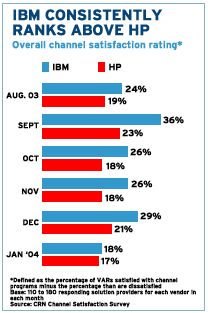Place Your Bets
IBM Chairman and CEO Sam Palmisano said it translates to market-share gains, specifically a 5 percent increase in server share in 2003. Indeed, market researchers IDC and Gartner both released 2003 server market-share reports last week that placed IBM at the top of the heap, followed by HP and Sun Microsystems.
But some HP VARs say sticking with HP has been the better bet. "It's really paid off for us not adding IBM," said Geoffrey Lilien, president of Lilien Systems, an HP-only enterprise solution provider in Mill Valley, Calif. "You can't be as good selling multiple platforms as you can just selling one. Our HP business was up more than 50 percent last year."

IBM targeted HP enterprise VARs as HP waged its battle to merge with Compaq. The goal was to sign up HP enterprise solution providers that had never carried IBM or to significantly ramp up IBM sales in VARs that predominantly focused on HP.
"I think there are a few hundred HP VARs actually carrying our lines where they were not before," said Palmisano. "So, a large number have moved over to IBM that were not there historically. [It] has also helped that more and more people are now representing us in the marketplace."
HP, Palo Alto, Calif., declined to comment.
One recruitment prize for IBM was Logicalis (formerly Logical), Bloomfield Hills, Mich., which created a stir at last year's PartnerWorld with an ad campaign that said, "HP's largest will soon be %85 IBM's largest in Unix servers." While that boast has yet come to pass, Logicalis President and CEO Mike Cox said his IBM business grew more than 100 percent in 2003, while his HP business was essentially flat.
Gary Melillo, vice president of business development at Melillo Consulting, a Somerset, N.J., solution provider, said he signed up to carry the IBM pSeries only so he could gain authorization to sell IBM software. And, he said, some of his ISV partners, notably Veritas Software, encouraged him to become IBM-authorized because some of their solutions run specifically on the IBM platform. "The majority of our business will be with HP and always will be," he said adding that his HP business for the past 12 months was up about 25 percent.
But Sysix Technologies, another former HP enterprise VAR that embraced IBM during the Compaq merger, has seen its IBM business grow 10-fold over the past two years, said John Sheaffer, CEO of the Oak Brook, Ill., integrator. "The timing was very serendipitous," said Sheaffer. "As we moved away from HP, we embraced IBM."
Sysix was ultimately deauthorized by HP a year ago and is now working with IBM to go after the integrator's installed HP base. "It's not a wholesale replacement of HP, it's getting staunch HP customers to go with IBM on their next project and establishing a foothold for the future."
Palmisano said IBM is slowing its recruitment drive to avoid disruption in the channel. "You want to make sure that the guys that are with you are keeping competitive and are making good money," he said. "You don't want too many partners in a segment. The best partner for us is a very profitable partner because they can afford to invest."

PALMISANO: IBM WILL STEER CLEAR OF
CONSUMER-ELECTRONICS MARKET
There's one market Sam Palmisano is willing to concede to rival Hewlett-Packard: consumer electronics. "We are enterprise, and we make no bones about what we are," said IBM's chairman and CEO. "Why enterprise? It's faster growing than other segments, and there are better margins. Our model is very straightforward. We want to generate invested capital better than the S&P 500. That is why we like enterprise, because it generates more shareholder value."
As IBM is eschewing the consumer market, rivals HP, Dell, Gateway and others are racing to get a piece of it. HP Chairman and CEO Carly Fiorina has maintained that HP's reach from the consumer to the enterprise is a big differentiator. "Our role is to drive that digital change in the home, just as we are doing for businesses,from the very smallest to the very largest," she has said.
Palmisano, however, says the business models are vastly different. "Strategically, I don't think you can do both," he said. "I know that some companies think you can. They think you can learn consumer electronics and music downloading and exploit that to large corporate outsourcing. The business model is so different; I don't know how you do that. I do know how to execute enterprise. I do understand how to take share in enterprise and win with clients."
